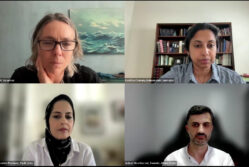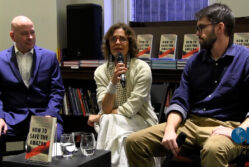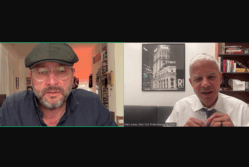Event Coverage Highlight

OPC Hosts Panel on Ukraine on the Brink of Russian Invasion
by Chad Bouchard
On Feb. 22, just two days before Russian President Vladimir Putin authorized “special military operations” in Ukraine and began artillery and missile attacks against Kiev and other major cities, three longtime residents of Ukraine discussed the possibility of war and its aftermath.
Peter Dickinson, a British journalist who is Ukraine Editor of the Atlantic Council and owner of Business Ukraine and Lviv Today magazines, predicted that sanctions from Western nations would not be enough to deter an invasion. He said the West would have to back Ukraine with arms and financial support.
“Ultimately that’s what will deter Putin. He doesn’t really care about sanctions. He’s more than happy to accept economic pain if he can achieve what he sees as a historic mission. This is a holy quest for him.”
Myroslava Hartmond, British-Ukrainian manager of a Kyiv art gallery, discussed Ukrainian soft power and the toppling of Lenin statues across Ukraine.
“I think the most important takeaway is that Ukrainians find the justification in their statehood in themselves, in the present day. You can choose examples from history, recent and ancient, but the most important thing is that Ukrainians believe that they are Ukrainians in 2022 and part of an independent sovereign state. And we don’t have to ask anyone permission to feel that way. And we are ready to fight for that.”
Brian Mefford, American owner of Wooden Horse Strategies, a Kyiv-based company that does polling, election observing and government relations, said if current events had played out in the 1990s instead of today, Ukraine would not be as resilient.
“You have an entire generation of people who were born after the Soviet Union. Everyone under the age of 30 or 31 has no recollection of that. And that has changed a lot of the psychosis. Also, the Orange Revolution and then later Euromaidan has changed the country because people saw that they could stand up for themselves.”
He added that the recent minimum wage and standard of living in Ukraine was higher than that of Russia, a sign that the market is working and economics are being disbursed among citizens, which poses a threat to Russia.
James Brooke, a former New York Times correspondent, was the moderator. After the Times, Brooke worked for eight years in Moscow and six years in Kyiv before returning last fall to his native Berkshires.
Click the window below to watch a playlist of video clips from the program.



